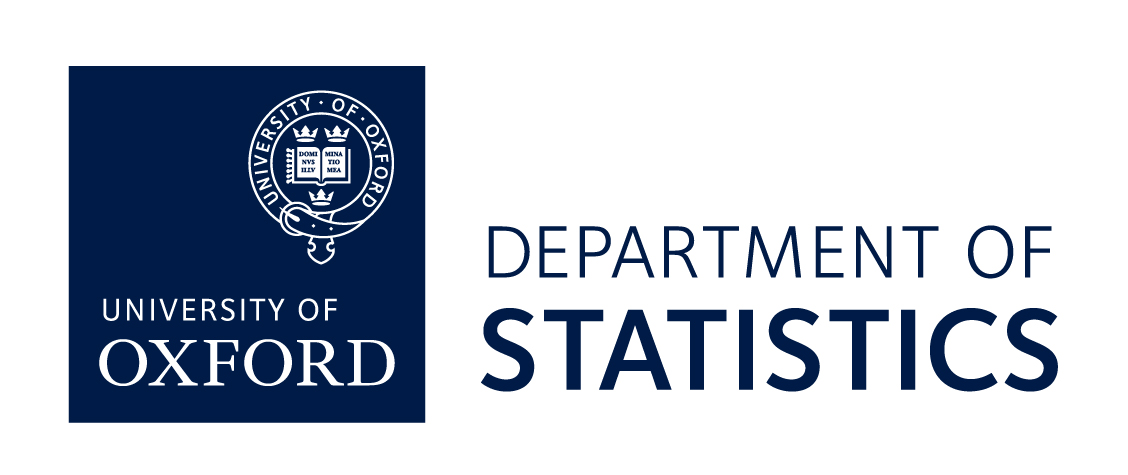About
In the DPhil in Statistics, you will investigate a particular project in depth and write a thesis which makes a significant contribution to the field. It can be in any of the subject areas for which supervision is available.
The Department of Statistics in the University of Oxford is a world leader in research in probability, bioinformatics, mathematical genetics and statistical methodology, including computational statistics and machine learning. Much of the department’s research is either explicitly interdisciplinary or draws its motivation from application areas, ranging from biology and physics to the social sciences.
You will be assigned a named supervisor or supervisors, who will have overall responsibility for the direction of your work on behalf of the department. You will have the opportunity to interact with fellow students and other members of your research groups, and more widely across the department. Typically, as a research student, you should expect to have meetings with your supervisor or a member of the supervisory team with a frequency of at least once every two weeks averaged across the year. The regularity of these meetings may be subject to variations according to the time of the year, and the stage that you are at in your research programme.
There are formal assessments of progress on the research project at around 12 to 15 months and at around 30 to 36 months. These assessments involve the submission of written work and oral examination.
The final thesis is normally submitted for examination during the fourth year and is followed by the viva examination.
You will be expected to acquire transferable skills as part of your training, and to undertake a total of 100 hours broadening training outside your specialist area. Part of that broadening training is obtained through APTS, the Academy for PhD Training in Statistics; this is a joint venture with a group of leading university statistics departments which runs four weeks of appropriate courses a year. You will give a research presentation or prepare a research poster each year in the department.
Our research students are actively involved in a lively academic community by means of seminars, lectures, journal clubs, working groups and social events. They receive training in modern probability, stochastic processes, statistical methodology, computational methods and transferable skills, in addition to specialised topics relevant to specific application areas. In particular, a broad structured programme of training in modern statistical methodology is available via courses in the Academy for Postgraduate Training in Statistics (APTS), of which the Department is a founding member.
Information about application deadlines, entry requirements and funding are available from the DPhil in Statistics prospectus page on the University of Oxford website.
Research Areas
Supervisors for DPhil projects are listed below, with links to the research group page.
Supervisor: Professor François Caron
Bayesian Statistics, Statistical Machine Learning, Statistical Network Analysis, Bayesian Nonparametrics.
Supervisor: Professor Tom Rainforth
Bayesian experimental design; Probabilistic and data-efficient approaches to machine learning; Active learning; Deep learning, with a particular focus on probabilistic approaches, deep representation learning, and deep generative models; Probabilistic programming; Approximate inference and Monte Carlo methods.
Supervisor: Professor Patrick Rebeschini
Investigation of fundamental principles in high-dimensional probability, statistics and optimisation to design computationally efficient and statistically optimal algorithms for machine learning.
Supervisor: Professor Yee Whye Teh
Machine learning. Probabilistic modelling, learning and inference.
Supervisor: Professor Frank Windmeijer
Causal Inference, Instrumental Variables Estimation (instrument selection using machine learning, weak instrument robust inference, bootstrap), Mendelian Randomisation.
Supervisor: Professor Julien Berestycki
Branching processes, branching random walks, coalescence, fragmentation, population genetics, reaction-diffusion equations, front propagation, random trees.
Supervisor: Professor Alison Etheridge
Stochastic analysis, especially problems related to stochastic modelling in population genetics.
Supervisor: Professor Christina Goldschmidt
Research area: random discrete structures (eg trees and graphs) and their scaling limits.
Supervisor: Professor James Martin
Probability theory, with strong links to statistical physics and theoretical computer science. Particular interests include: random graphs; interacting particle systems; models of random growth and percolation; models of coagulation and fragmentation; queueing networks.
Supervisor: Professor Gesine Reinert
Investigation of networks such as protein-protein interaction networks and social networks in a statistically rigorous fashion. Often this will require some approximation, and approximations in statistics are another of my research interests. There is an excellent method to derive distances between the distributions of random quantities, namely Stein’s method, and I am interested in Stein’s method also from a theoretical viewpoint. The general area of my research falls under the category Applied Probability and many of the problems and examples I study are from the area of Computational Biology.
Supervisor: Professor David Steinsaltz
Random dynamical systems, particularly with applications to population ecology. Evolutionary and biodemographic models of ageing.
Supervisor: Professor Matthias Winkel
Probability and stochastic processes, in particular problems involving branching processes, Levy processes, fragmentation processes, random tree structures.
Supervisor: Professor Charlotte Deane
Developing novel methodologies to understand and predict protein evolution, interaction, structure and function.
Supervisor: Professor Garrett Morris
Developing novel therapeutics and improving our understanding of living systems at the molecular level, in particular methods development in computer-aided drug discovery. Harnessing the increasing amounts of experimental data, and the development of novel algorithms in chemoinformatics and bioinformatics, machine learning, network pharmacology, and structural biology, to help solve real-world drug discovery problems.
Supervisor: Dr Fergus Imrie
Machine learning for drug discovery; structure-based approaches for designing potent and selective small molecules; generative modelling; experimental design and decision-making in drug discovery; efficient learning from small and noisy data; uncertainty estimation.
Supervisor: Professor Christl Donnelly
Epidemiology of infectious diseases (of humans and animals); Real-time analysis of outbreaks; Biostatistics; Disease ecology; One Health; Pandemic preparedness; Digital epidemiology; Evidence-based policymaking; Applied statistics..
Supervisor: Professor Anastasia Ignatieva
Intersection of probability, statistics and computation, applied to problems in genetics, analysing sequenced genomes.
Supervisor: Professor Simon Myers
Statistical and population genomics (fine-scale population structure and migrations, recombination, natural selection on complex traits, association testing, demographic history), statistical approaches for single-cell data (RNA-seq, ATAC-seq), genetic determinants of speciation and fertility in mammals.
Supervisor: Professor Pier Palamara
Statistical and machine learning methods for large-scale genomic data, with applications in population genetics (reconstructing evolutionary and demographic history from modern and ancient DNA) and statistical genetics (complex trait heritability, association, polygenic prediction, fine-mapping).
Supervisor: Professor Robin Evans
Graphical models; Causal inference; Marginal modelling; Combining causal information from different experimental settings; Confounding and selection bias; High-dimensional model selection, and low dimensional model selection in the presence of high-dimensional confounders.
Supervisor: Professor Geoff Nicholls
Applied Bayesian Statistics and Statistical Methods, focusing on building and fitting models for complex stochastic systems; Generalised Bayesian Inference; Exploring how Machine Learning and AI methods can be used in Statistical Inference.
Supervisor: Professor Patrick Rebeschini
Investigation of fundamental principles in high-dimensional probability, statistics and optimisation to design computationally efficient and statistically optimal algorithms for machine learning.
Computational Biology and Bioinformatics
Supervisor: Professor Christl Donnelly
Epidemiology of infectious diseases (of humans and animals); Real-time analysis of outbreaks; Biostatistics; Disease ecology; One Health; Pandemic preparedness; Digital epidemiology; Evidence-based policymaking; Applied statistics..
Supervisor: Professor Simon Myers
Statistical and population genomics (fine-scale population structure and migrations, recombination, natural selection on complex traits, association testing, demographic history), statistical approaches for single-cell data (RNA-seq, ATAC-seq), genetic determinants of speciation and fertility in mammals.
Supervisor: Professor Pier Palamara
Statistical and machine learning methods for large-scale genomic data, with applications in population genetics (reconstructing evolutionary and demographic history from modern and ancient DNA) and statistical genetics (complex trait heritability, association, polygenic prediction, fine-mapping).
Supervisor: Professor Gesine Reinert
Investigation of networks such as protein-protein interaction networks and social networks in a statistically rigorous fashion. Often this will require some approximation, and approximations in statistics are another of my research interests. There is an excellent method to derive distances between the distributions of random quantities, namely Stein’s method, and I am interested in Stein’s method also from a theoretical viewpoint. The general area of my research falls under the category Applied Probability and many of the problems and examples I study are from the area of Computational Biology.
Contact
Queries about the DPhil in Statistics or MSc by Research in Statistics should be sent to graduate.admissions@stats.ox.ac.uk



